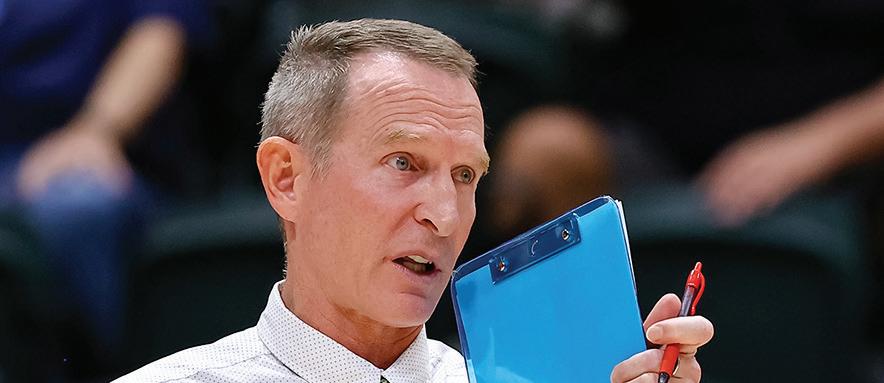

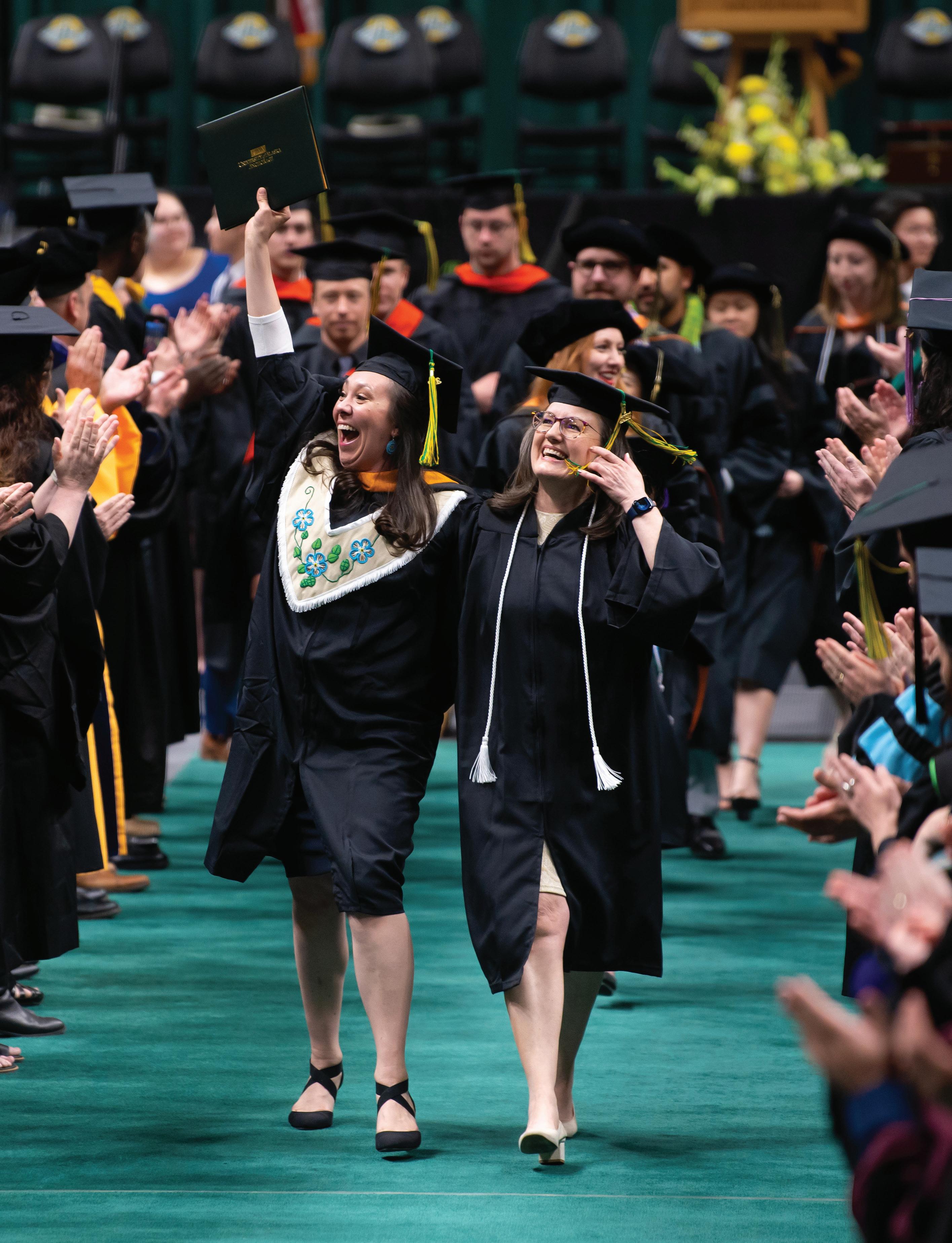




Green speaks about his decision to resign, and the scheduling conflict with volleyball and the Great Alaska Shootout.
By Avery Williamson sports@thenorthernlight.org
Chris Green announced his resignation as UAA’s head volleyball coach on Nov. 21. Assistant coach Stacey Meisner has been named the interim coach. Green said the scheduling conflict with volleyball and the Great Alaska Shootout was a large factor in his resignation.
Green’s impact on Seawolf volleyball is impossible to miss. He posted a 313-116 record over 15 seasons, including 11 NCAA tournament appearances in the last 13 seasons. The Seawolves made only two tournament appearances in 28 seasons prior to Green’s arrival.
He was named the Great Northwest Athletic Conference Coach of the Year six times – including this year – and was named the American Volleyball Coaches Association Division II National Coach of the Year in 2016.
Green also coached nine All-Americans, six GNAC Players of the Year, six GNAC Newcomers of the Year and five GNAC Freshman of the year.
Green has been a crucial part of Seawolf volleyball and its success. After winning his fourth GNAC title with UAA this year, to advance to the NCAA tournament, the Seawolves lost in the first round against Chaminade. Green said he was not only disappointed with the season’s end but also with UAA administration.
By winning the GNAC title, the Seawolves should have been rewarded homecourt advantage. However, the Alaska Airlines Center gym was double booked with both the volleyball games and the Great Alaska Shootout being scheduled that weekend.
After a four-year hiatus, administration was thrilled to bring the Great Alaska Shootout back. “It’s been years in the making of bringing that tournament [the Great Alaska Shootout] back to our campus so we were really excited to bring back that Alaska tradition,” said athletics director Ryan Swartwood.
The Shootout was scheduled in August before the volleyball rankings were released. However, Swartwood said they
knew if volleyball won the GNAC title, there would be a scheduling conflict.
After defeating Saint Martin’s in three straight frames to secure the No. 1 seed in the West Region, the team rejoiced that they would host the tournament. But Green said he had to tell the team this wasn’t the case.
“It was difficult for the team because I had to let them know on the night that we won the GNAC championship because people were making plans to fly to Alaska,” said Green.
“I just couldn’t wait, so the night that we won the GNAC championship, which should have been a night of celebration, ended up being disappointment.”
Green was just as disappointed as his team. Most of all, though, he was frustrated with administration. He said he found out about the scheduling conflict on Sept. 30 and met with Swartwood on Oct. 2 to discuss the conflict.
“For the event to be scheduled originally on the same date as the West Regional volleyball tournament without me being consulted I think, in looking back, is something that really bothered me,” said Green.
“I asked Ryan ‘why did you sched-
ule it?’ and he goes ‘we were taking a chance.’ The chance is slim that we are going to host ever because it’s tough to be the number one seed in the West Region.”
For Green, the solution was to reschedule the Shootout. However, Swartwood said this wasn’t an option.
“We had conversations about moving the game times back,” said Swartwood. “Ultimately, the number of tickets we had out in the community and the resources we had invested from a marketing perspective, moving the Shootout times up in the day was not feasible.”
Green said when Swartwood told him this, he didn’t understand. “He said that the basketball tournament was inflexible,” said Green. “I guess I didn’t understand that but I took his word for it.”
“You know, that’s a long time, that’s a month and a half away, so I’m not sure why he was saying it was inflexible. Everything is flexible. I don’t understand that.”
Swartwood submitted a bid to the NCAA for an exception on match times for West Regionals. Green said he warned Swartwood that the NCAA might decline their bid and suggested they make a backup plan.
“I strongly suggested several times, four times maybe, that he really needed
to have a plan B because if the NCAA didn’t accept those time changes that we needed to have another plan to present to the NCAA to make sure that we had two alternatives,” said Green.
However, a second plan was never made and the bid was not approved. The NCAA made the decision to hold West Regionals in Bellingham, Washington. Green said he thinks losing home court advantage may have cost the team their season. “To be honest with you, I think we could be playing right now in the National Championship,” said Green. “I think, with a home court advantage, our team had a chance to win the West Region. I’m not going to use that as an excuse for why we lost in the first round, but anyone can tell you that home court in front of a home crowd — and our crowd is the best in the country — would have given us an advantage.”
Four days after the Seawolves lost against Chaminade, Green submitted his letter of resignation. A few hours later, he met with the team and five recruits that have already signed with UAA to let them know.
Green said he saw retirement in the near future, but he wasn’t planning on retiring this year. “I have been considering retiring or resigning down the road, so this was kind of just the straw [that broke the camel’s back],” said Green. “I think what transpired accelerated that time line a little bit.”
Though he resigned, he plans to keep supporting UAA volleyball. “I’ll go watch them play, for sure. I plan to be a big fan of them next year,” said Green.
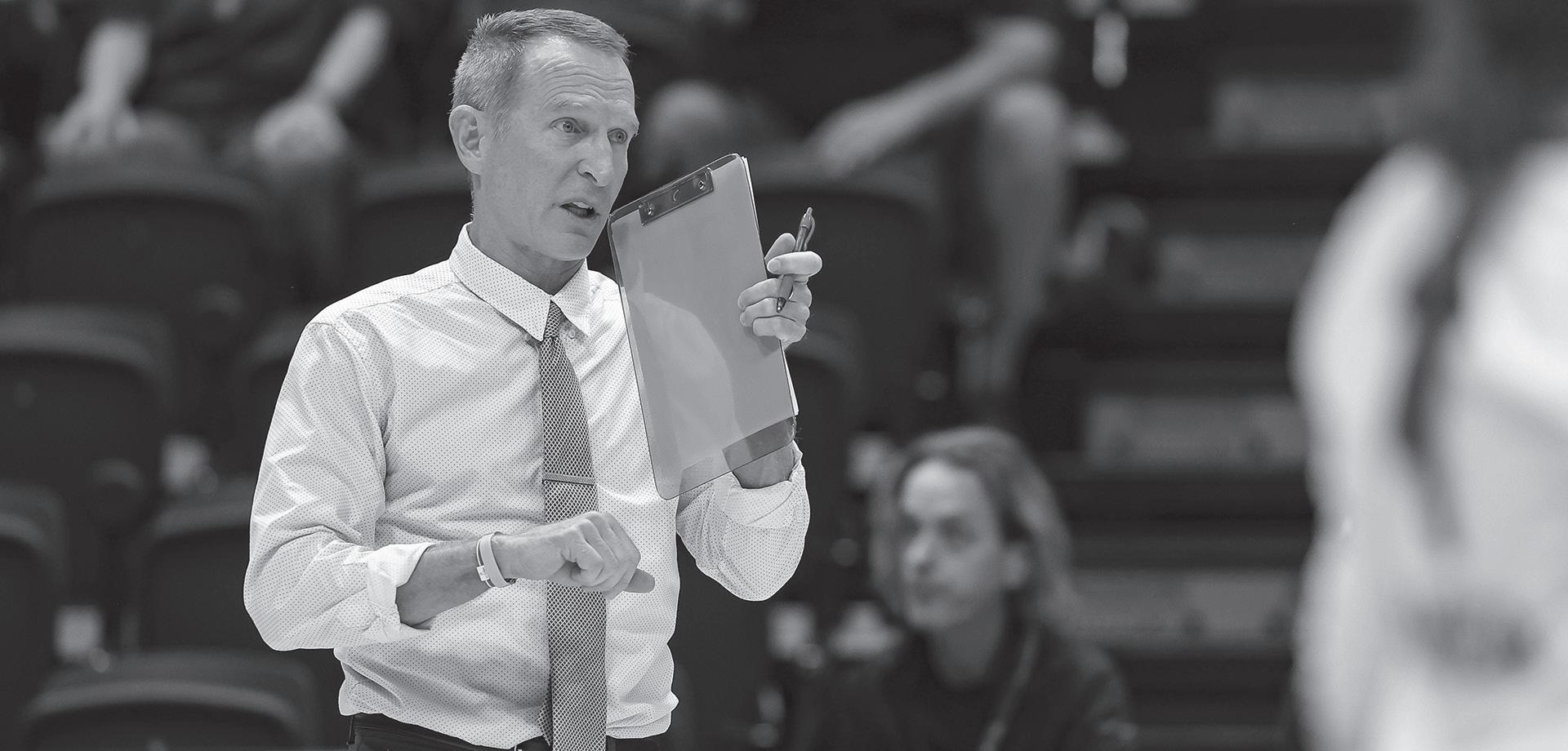
By Dylan Flos contributer@thenorthernlight.org
Alaska’s midterm elections were the talk of the town well beyond the borders of the state this year, with the passing of Don Young in March leaving open the state’s only U.S. House seat.
The nation was watching to see if Democrat Rep. Mary Peltola would be able to retain her seat in a usually redheavy state after being elected in the special election that occurred earlier this year. For reference, the last Democrat to take position in the Alaskan House of Representatives was Nick Begich Sr. in 1972, half a century ago and a year before Peltola herself was born.
In 1973, Don Young was sworn in and served as Alaska State Representative until his death in 2022. Those 49 years made him the longest serving Republican representative in history.
Four candidates vied for the position in this year’s election: Mary Peltola, a Yup’ik woman, tribal judge, and executive director of the Kuskokwim River Inter-Tribal Fish Commission; Sarah Palin, former Alaskan governor as well as former mayor of Wasilla; Nick Begich III, the grandson of Don Young’s predecessor Nick Begich Sr and Chris Bye, former military service member, local Alaskan, and fishing guide.
Peltola seems to have won over the Alaskan public in her few months in office, winning the election by nearly 10%, or nearly 24,000 votes.
The ultimate totals, once rankedchoice votes had been calculated, were Peltola with 54.9% and Palin with 45.1%.
In the Senate election, Republican Lisa Murkowski took 53.7% of the votes, with another Republican, Kelly Tshibaka, coming in second.
Mike Dunleavy won re-election as governor with 50.3% of the votes. Dem-
ocrat Les Garas came in second with 24.2%, and the nonpartisan Bill Walker came in with 20.7%.
From speaking with students on campus, it seems that voting was a relatively simple and easy experience, with most students having the opportunity to vote on campus. For those that couldn’t, a total of 80 different voting locations across the Anchorage area eliminated the possibility of exaggerated wait times or crowds.
One new piece of confusion hit voters this year, however: the introduction of ranked choice voting.
Some argue that ranked choice voting was too complicated and confused voters, potentially altering results. These complaints were heard loud and clear after the special election earlier this year, and voting locations this November all had posters, pamphlets, signs and guides carefully spelling out how to properly fill out a ranked choice ballot. Beyond that, election workers were able to further explain.
It seems many of the students who voted were happy with ranked choice voting, being outspoken in their support of it after their first experience with it, claiming it made voting feel a little bit more meaningful.

By Kyle Ivacic news2@thenorthernlight.org
The 2022 election season was important to voters for various reasons. On the table were decisions about topics such as abortion, crime, inflation, gun laws, and homelessness. Nearly all elections ran smoothly, even in the wake of divisive attack ads and a combined candidate spending of $16.7 billion according to Open Secrets, a Washington D.C. based campaign finance watchdog.
When the 118th U.S. Congress convenes in January of next year, what can we expect?
According to the AP, the legislative branch will be split between Republicans and Democrats. The House flipped to Republican control while the Senate will remain in Democratic hands. This is likely to result in significant legislative gridlock if senators and representatives are not willing to cross party lines.
The House, with its 435 members, has been under Democratic leadership since 2019, but will
now be handing the reins over to the Republican party, who won enough seats to bring the party over the threshold needed for a majority. Republicans control 221 House seats at time of writing.
Control of the Senate, meanwhile, will not change, as Democrats have secured 50 seats, including 2 independents who caucus with dems, and have Vice President Kamala Harris to cast tie-breaking votes.
Here is how races have played out so far for America’s five most populous states:
California
Senate: 1 seat up for election – won by Democratic party
House: 52 seats up for election – 40 won by Democratic party; 11 by Republican party
Texas
Senate: No seats up for election
House: 38 seats up for election – 25 won by Republican party; 13 by Democratic party
Florida
Senate: 1 seat up for election – won by Republican party
House: 28 seats up for elec-
tion – 20 won by Republican party; 8 by Democratic party
New York
Senate: 1 seat up for election – won by Democratic party
House: 26 seats up for election – 15 won by Democratic party; 11 by Republican party
Pennsylvania
Senate: 1 seat up for election – won by Democratic party
House: 17 seats up for election – 9 won by Democratic party; 8 by Republican party
An interesting race to keep an eye on is the Georgia senatorial election between Democrat Raphael Warnock and Republican Herschel Walker. Neither candidate passed the 50% mark required by Georgia law, therefore pushing the election to a runoff that will take place on Dec. 6. Georgians are already heading to the polls as early voting has commenced.
What do changes to the congressional makeup mean for Alaska?
It is likely that U.S. energy policy will make a continued shift toward renewables, but with Republican House control,
there is the possibility for expanded investment in natural gas and oil as Republicans ran on securing U.S. energy independence.
Also on the table is continued infrastructure investment if the Biden administration remains willing to work with both chambers of Congress on funding developments across the country. These developments include bridge construction, railroad
maintenance, pavement upkeep and energy production.
These funds are expected to help modernize and maintain the state’s busy airports, such as Ted Stevens Anchorage International, and upgrade the Port of Alaska in Anchorage, which is a key import entry point. It remains to be seen what exactly lies ahead, but Alaskans will likely see the most change on the state level rather than national due to the passing of Republican Rep. Don Young and the unprecedented election of Democrat Mary Peltola to our lone house seat.

Supporters say a single powerful company would be able to compete with Amazon and Walmart, those against say it will drive up prices
Kellie Davis features2@thenorthernlight.org
Corporate giants Kroger and Albersons are getting ready to merge. If it happens, consumers, for better or for worse, will pay the price.
“The combination of Kroger and the Albertson companies is a tremendous opportunity to bring together two highly complementary organizations,” said Kroger CEO Rodney McMullen, who promised efficiencies and a “world-class shopping experience.” The argument from Kroger-Albertson’s is that they will be able to better compete with giants like Walmart and Amazon.
To many Alaskan’s ears, the bringing together of these two stores and “efficiencies” means downsizing. In Alaskan cities and towns, Fred Meyer and Carrs-Safeway stores are often near each other, with stores sometimes across the street.
“And what that means when they say they’re getting more efficient, which is how they sort of sell this, is they mean they’re firing people,” said Graham Downey in an Alaska Public Media article, a consumer ad-
vocate with the Alaska Public Interest Research Group. They will reduce their overhead expenses by reducing their workforce, but still have the same volume of customers.
Kroger is the parent company of Fred Meyer and Albertson’s is the parent company for CarrsSafeway. Downy said that where there are stores competing across the street from each other, one will close. There won’t be two stores trying to arm wrestle over the lowest price on necessities, and they will be able to name their price.
In Alaska, Safeway stores are unionized and Fred Meyer stores are not. The United Food & Commercial Workers Union Local 1496 has been negotiating with Fred Meyer, but so far has not commented on the merger.
Vivek Sankaran, the CEO of Albertsons, said that the merger will upgrade stores and expand on the brands they sell, but this means little to Alaskans who are concerned about food security. While there are smaller stores — such as the Alaska Commercial Company and Three Bears in South Central Alaska — the 12 Fred Meyer and 35 CarrsSafeway stores are what serves

the greater population of Alaska.
The potential merger, planned to happen in 2024, has Alaskan lawmakers worried. Reps. Ivy Sponholz and Zack Fields co-chair the Alaska House Committee on Labor and Commerce. In October they sent
a letter to FTC Chair Lina Khan requesting that the FTC block the merger.
“That would be the first time in human history that reduced competition has lowered prices,” Fields is quoted in Alaska Public Media. “I don’t think this company is going to suspend the laws of economics and common sense. To the contrary, they would be closing stores,
reducing consumer choice, and of course, because there’s no longer meaningful competition, raising prices.”
Carrs and Fred Meyer are two of Alaska’s largest employers and the merger will impact thousands of workers in the state. The merger won’t just hurt purchasing power for consumers, but take away bargaining power for the workers too.

The pandemic pulled the plug on UAA Robotics, but there are sparks of life
By Matthew Schmitz editor@thenorthernlight.org
A robot sits motionless in a room on the third floor of the Engineering and Industry Building. It looks like it should be crawling across the surface of Mars or deployed to inspect suspicious packages by the bomb squad.
Unfortunately, how it works largely remains a mystery. The pandemic forced the club that built the machine, UAA Robotics, to pause their activities. Senior members graduated – taking their knowledge with them – and the addition of new club members was halted.
Mya Schroder is a student at UAA, dual majoring in computer science and computer systems engineering.
Schroder joined the robotics
team in fall of 2021. She said there were only around four members last year.
Becoming the club president at the end of the spring semester, she said she spent the summer thinking about the club and realized she needed to get more people to join.
Her efforts included setting up a booth at campus kickoff, reaching out to advisors to help make students aware of the opportunities on the team, and posting signs around campus.
She said she took the time to talk to everyone she knew about UAA robotics and posted information in the discord servers of various clubs and academic departments that had members who might be interested.
Around 40 people showed up to the first meeting this semester, she said, though many were
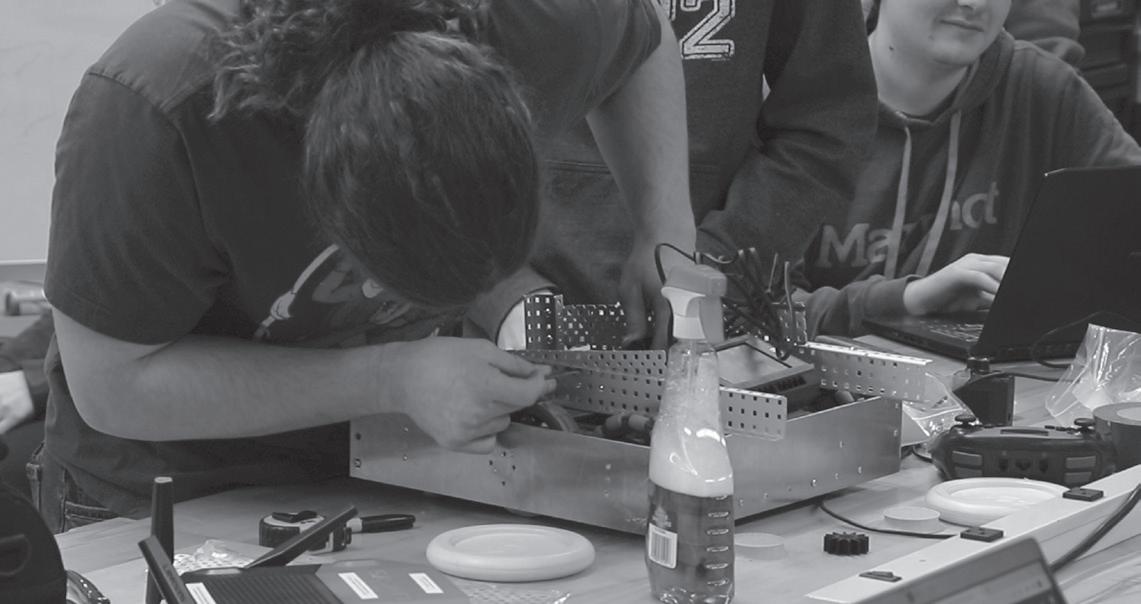
just checking it out. She said the number of team members who participate regularly is now around 20.
While the numbers are impressive, “I would love more people,” she said.
Around two-dozen people showed up to their meeting on Nov. 18 in room 316 of the Engineering and Industry Building.
UAA will be competing in the VEX U robotics competition for the first time this year, said Schroder. In the past, the robotics team had competed in the University Rover Challenge. A previous team built the aforementioned robot, which sits idle in the same room.
Schroder said they decided as a group at the first meeting to compete in VEX U.
Schroder said the robotics team decided to go for VEX U because it’s a simpler competition, designed to be completed in one year, whereas the University Rover Challenge is a multiyear project that requires extensive knowledge of robotics.
Schroder said most members on the team are new to robotics. She said there is more opportunity for travel with VEX U as well.
The competition will pit them against another college team. To score points their robot must move disks into an opponent’s goal, which looks like a frisbee golf basket. They can also score points by moving disks into an area on the ground and spinning
In 2022, consumers can’t seem to catch a break.
By Mark Zimmerman
Contributing writer
Over the last year, supply chains have been hamstrung by sharp rises in raw material costs, labor shortages, global inflation and an inconveniently-timed war in Eastern Europe. These issues are big; they affect many industries. Here on campus, these woes have somehow crept their way into the common university tradition of branded pennants and wall flags.
One Word — Merchandising! Shopping for school spirit is still possible for UAA campus and sports fans. The online and in-person Seawolf stores still cover collectibles of various categories, including stuffed animals, volleyballs, note cubes, thank-you cards, adult clothing, baby clothing, swim bags, golf chip markers.
An interesting omission from their catalogue, however, is the venerable pennant. While normally a fixture in such an exhaustive list of school merch, pennants seem to escape both the website and the in-person Seawolf store.
Store Manager Isabel Mead said this is the culmination of an uphill battle that’s lasted most of
the year.
“The Seawolf Store sold pennants as recently as March 2022,” Mead said, “At the moment, we are seeing delays with new and reorders of pennants as well as other licensed merchandise categories.”
During a normal year, Mead says the store keeps three different types of pennants in stock.
For the first time since she started working with the Seawolf/ book store in 2008, this isn’t the case. The aforementioned issues of supply chains and postpandemic knock-on effects have kept some categories perpetually sold-out.
Mead says the pennant category in particular is an important one to her.
“We are already working with our vendors to bring new pennants in.”
Despite this, sales continue at the store as on-campus sporting events pick up. The Seawolf Store having such a strategic location in the Alaska Airlines Center certainly helps. According to Mead, the 8” Spirit Seawolf plush and the tried-andtrue Seawolves Classic Mug are current customer favorites in the non-clothing realm.
Tying it all Back
Going into the holiday season, suppliers have faced many
a roller painted with each team’s colors.
They have a final opportunity to score some points by having their robot expand and cover as much of the arena’s tiles as possible at the end of the game.
There was a bustle of activity at the meeting on the 16th.
Some new team members were being shown how to cut metal parts using a band saw, and a 3D printer was fabricating pulleys for the robot that will be competing this year.
The robot isn’t complete yet, though it is coming together. Before they started fabricating anything, it was designed using CAD software called AutoDesk Fusion.
In another room, away from the noise of the team responsible for designing and building the body of the robot, the programming team talked about writing the code that would be running the machine.
A member of a high-school First Robotics Competition team was also present to observe and learn from the college club.
Schroder said she tries to make sure that everyone who shows up feels included. One of the biggest challenges, she said, is using everyone’s time wisely.
Schroder normally presents the team with a list of tasks that need to be worked on, and club members break off into groups to work on the tasks they are interested in.
In addition to the tasks of
building the robots, there are “soft tasks” like working on promotional material for the club. They are also careful to document everything – partly because of lost knowledge from the pandemic and partly because of VEX U requirements.
The team will be traveling to Dallas, Las Vegas and Saint Cloud, Minnesota, next semester to compete in the VEX U challenge, and UAA will host a remote competition on Jan. 22.
Schroder said she would like to see a return to the University Rover Challenge though they would need a bigger team. Finding and recruiting more people is still a high priority for her. She said robotics is open to anyone who is interested.
“You don’t need to be in STEM to have fun with it.”

difficulties keeping all kinds of goods flowing. While issues of logistics and economy might seem like large, impersonal forces, even low-volume and admittedly niche things like pennants can be affected by them.
Even though this inquiry started off with pennants, I was unfortunately brought right back to the oft-maligned economics of 2022.
The bounce back from the pandemic has brought an inconvenient pressure with it. Goods as diverse as petroleum and sports flags have been impacted, and the realities of unstable global commerce are starting to hit. While some sectors are stronger than others, every price increase and shipping delay has caused a challenging year for the world, and indeed students.
The Seawolf Store: A Campus Cornerstone Students at UAA have always had some way to buy university merchandise. The campus store where most students have shopped over the years — called the Bookstore — opened in 1983. The name notwithstanding, it was also responsible for selling all kinds of Seawolf gear, including shirts, lanyards and green-and-gold banners. Students’ ability to school spirit was merely an impulse-buy away.
Since 2020, the all-online

bookstore has been decoupled from the merch-focused Seawolf Store. Luckily for students and event attendees, the merchandise store shop remains a physical location. It even handles packages, mostly textbook orders of course. The staff are cheerful and conversational, and willing to field any questions students may have. Students can still find some books across genres on the clearance shelf, and school supplies are readily stocked. The focus, however, has shifted to fit the new, smaller location. Long gone are tech-for-sale, the dedicated coffee shop, and other amenities of the old bookstore. This more streamlined store makes UAA memorabilia
and graduation gear its passion, with things like notebooks and drinks relegated to less prominent spots. Hopefully, these challenges will subside, and UAA pennants will once again be an errant click away from a credit card charge. People like Isabel Mead, though more towards the client side of things, are still key combatants in a long and drawn out struggle against our own supply chains.
Visit the UAA Seawolf Store in Person at the Alaska Airlines Center in Room 160, or visit the online store at bookstore.uaa. alaska.edu/uaa1/merchandise. In-person store hours are Monday through Friday, 12 PM to 6 PM.
job hunting advice and a variety of resources available to
By Taylor Heckart news3@thenorthernlight.org
It’s been a long road for our new graduates. After countless late nights, challenging assignments and far too much caffeine, many Seawolves have finally earned a hard-fought degree. It’s finally time to celebrate and take a well-deserved break. But, after all that is done, a question remains: Now what?
For those looking for additional resources and support, many UAA services are available to alumni after graduation. These resources are available for those yet to graduate as well.
Alexis Rasley is the Career Development Coordinator for Career Services. Rasley said that Career Services is open to all students, current and former. In addition to one-on-one appointments about resumes, cover letters, mock interviews, and job searches, career services also provides workshops and career fairs that are open to alumni as well as students.
“We can also do appointments on things like salary negotiations, and how to accept or decline an offer. We get a lot of questions about that from our alumni,” said Rasley. Appointments can be made online using Handshake.
Handshake, UAA’s free career management platform, is a resource for those looking for jobs after graduation.
“What’s really great about Handshake above LinkedIn or Indeed,” said Rasley, “is that the
employers that are connected on Handshake are the employers we’re building relationships with, so they’re specifically looking for UAA students or recent graduates.”
Rasley said this helps decrease some of the competition for jobs that exists on other sites. Jobs, internships, and a few fellowships and volunteer opportunities can be found on Handshake.
Career Services’ next career fair is March 6th and March 7th from 2-6 p.m. at the Student Union and is open to students and alumni.
Rasley said that when looking for a job, it’s important to think about what you want as a whole: consider your ideal lifestyle, hours, benefits and other priorities when looking for a career. She also said it’s important to research prospective employers and do informational interviews in order to make sure they match your needs.
Emily McLaughlin, who graduated in 2013 from the Journalism and Public Communication program, said the advice she has for graduates is to be curious.
“If someone came to me and was like, ‘Hey, I’m curious what it’s like working at an agency. Could we grab coffee? And can I pick your brain about it?’ I would say yes, in a heartbeat.”
McLaughlin said that the connections she had with clubs and other students is the reason she has her current job in public relations. In college she joined

the Public Relations Student Society of America, which helped her gain professional connections. A classmate in the same group that connected her to the internship would lead to her current job at Thompson & Co Public Relations.
“The classmate connection was huge.”
Kate Consenstein graduated in 2011 with a degree in Journalism and Public Communications, and is now the president and founder of Rising Tide Communications. She found a lot of support from the professors in her program who helped her figure out where she wanted to go after graduation. She said, “I always felt that I could return to UAA, specifically Paola [Banchero], and seek good advice and good resources.”
Consenstein said that graduates should keep their minds open. “My advice is to look at all different kinds of jobs and consider what skillsets you
By Kyle Ivacic and Kellie Davis
news2@thenorthernlight.org features2@thenorthernlight.org
The Alaskan economy has faced setback after setback. Recent economic news has been grim with reports that the state ranks at or near 50th in the nation for certain measures of economic growth. A stagnant economy that has been years in the making poses unfortunate choices to young people. Graduating college seniors must choose between staying in Alaska or moving to the lower 48’s warmer climes.
According to the U.S. Census Bureau, the state’s population is shrinking so much that even our largest city, Anchorage, which peaked at 301,801 people in 2013, has faced declines by the thousands. The latest Census Bureau estimates show that Anchorage has 288,121 residents.
Even with a declining population, housing prices have soared because of inflation. According to Alaska Department of Labor and Workforce Development data, in 2021 Alaskan homes sold for an average of $388,648 while that number was $303,626 in 2013. This is a 28% increase from 2013 to 2021 while during the same period the dollar only inflated by 17%, according to the Bureau of Labor Statistics.
Alongside housing costs, it is no secret that Alaskans pay a steeper price for most goods
than our counterparts to the south because of high shipping costs. A trip to the gas pump or the grocery store is usually more expensive than in other states.
According to the University of Alaska Center for Economic Development, the Alaska economy has measured poorly on several key indicators including employment growth, unemployment levels, gross domestic product, and net migration. When adjusted for inflation, the report’s data show that the state’s GDP shrank by 7.1% from 2015 to 2021.
UAA seniors graduating this semester are all too familiar with the economic situation. Many are having issues deciding what to do post graduation as the U.S. economy picks up speed coming out of the pandemic and Alaska lags behind. The choice might seem obvious – leave before things get worse.
To get an idea for options available to seniors, TNL conducted an interview with Alexis Rasley who is a Career Development Coordinator at UAA Career Services. Rasley said that Career Services and the university have a multitude of resources available to help, even in hard economic times.
Rasley said: “What’s really, really important is: A. knowing exactly what you want. I think when you’re throwing out a bunch of resumes everywhere, not really sure what you’re hopeful for, that can be tricky. B.
Once you really know what you want - tailoring that resume and that cover letter specifically. Every single resume and cover letter needs to be specific to the job you’re applying for.”
In the Career Services office, there is a wide selection of career development books available for students to read. These range from resume example texts to personal skills assessments that can help in the job application process.
Rasley mentioned that the university utilizes Handshake as a local and national outreach employment tool. They form partnerships with local Alaskan businesses to facilitate student employment and networking prospects. Handshake is much like the popular online networking service Indeed. However, Handshake is made specifically for students and therefore the participating employers are seeking college-aged talent.
Alaskans have unfortunately had a large number of politicians and administrators who have failed to solve the economic problems we are currently facing. Some people have come to the consensus that the state has relied far too much on oil for far too long.
UAA professors Kevin Berry and Matthew Berman share this consensus. In an opinion piece published by the Anchorage Daily News on Oct. 11, Berry wrote about the state’s multitude of funding issues and decades
may have generally developed through your education that might take you in a direction you may not have necessarily thought you’ve been prepared for during your education.”
For those looking for help with any kind of writing endeavor, professional or otherwise, the Writing Center is also a good resource for alumni.
“As far as the resources we can provide, we encompass all areas of academic, professional, creative, or personal writing,” wrote Mark Zimmerman, a consultant at the Writing Center, in an email. Zimmerman wrote that any kind of writing is encouraged from anyone in the community regardless of their status at UAA.
In addition, alumni are still welcome to access the Consortium Library. According to Steve Rollins, the dean of the Consortium Library, alumni with an Alumni WolfCard can
of policymaking that has made Alaska unattractive to young people. The piece describes a more economically vibrant Alaska that would be possible by shifting the focus from oil to infrastructure development — especially in the tourism industry — and a budget that will produce quality education for all students.
Berman agrees with Berry’s take and wrote in an email that “the state has relied on the oil and gas industry for the past 50 years, and the industry, while still an important part of the state economy, is inevitably declining.”
Berman went on to write that there was a point in time, before oil, that Alaskans were willing to pay higher taxes to fund essential aspects of the state’s workings like infrastructure improvements and education on all
get access to the library’s afterhours facilities and check out materials.
After graduation students can’t use online library databases, but Rollins recommends the Statewide Library Electronic Doorway, known as SLED, for Alaska residents who need database access. More information about alumni library access can be found at the Consortium Library website.
Finally, for those interested in staying connected with UAA after graduation, the UAA Alumni Relations website provides a list of current alumni chapters.
According to the UAA Alumni Relations website, “Graduates of UAA and our community campuses across Southcentral Alaska earn automatic membership to the UAA Alumni Association, as do individuals with 12 or more credits who are no longer active students. The association is open to all our alumni; there are no membership fees.”
levels from kindergarten to university.
Alaskans will ultimately decide what becomes of the state. Through voting, advocating for economic diversity, and employing their skills on the local or state levels, Alaskans can weather the storm and come out with a stronger, more vibrant economy. The people of Alaska brought themselves to this crisis and are therefore able to undo it if hard work is done on rethinking what makes Alaska tick.
As for graduating seniors, they should base their decisions on what is best for them and their families. For some that means staying and making a difference here, but for others it means moving to states that have invested in themselves through economic diversification, adequate education funding, and infrastructure investment.

holiday
By Taylor Heckart news3@thenorthernlight.org
It’s a crowded scene at the Performing Arts Center as hundreds of people, from toddlers to grandmothers, pour in and fill the seats of the Atwood Concert Hall. Most people are dressed to the nines, with well-pressed suits and sparkly tiaras catching the light as they settle in for the performance. The Anchorage Symphony Orchestra begins to tune their instruments as the eyes of an illustrated nutcracker onstage peer back and forth, delighting the few children who squeal when they realize it’s moving.
When the curtain finally lifts, it’s to a stage filled with colorful sets, beautiful and intricate costumes, and even the occasional burst of flame and fog. The story of The Nutcracker is alive through dance, depicting parties, battles, and a cast of colorful characters. At one point dancers are lifted into the air in a colorful hot air balloon. The
entire show feels like something out of a storybook, telling a story without any words.
The Nutcracker returned to Anchorage this winter after a three year break. This year is the 31st Anchorage Concert Association presentation of this ballet in Anchorage, with Eugene Ballet returning to the stage for this performance.
With the return of Eugene Ballet comes the return of some dancers who have been a part of The Nutcracker from the beginning. This marks the 15th season that principal dancers Danielle Tolmie and Mark Tucker have been with Eugene Ballet. Both have been a part of every Eugene Ballet Nutcracker performance in Anchorage.
“The Nutcracker is really a ballet that opens up opportunities for a lot of the younger dancers to prove themselves and their skills and their performing abilities,” Tucker said. He said that this challenging ballet is an opportunity to show off the depth of a company beyond just
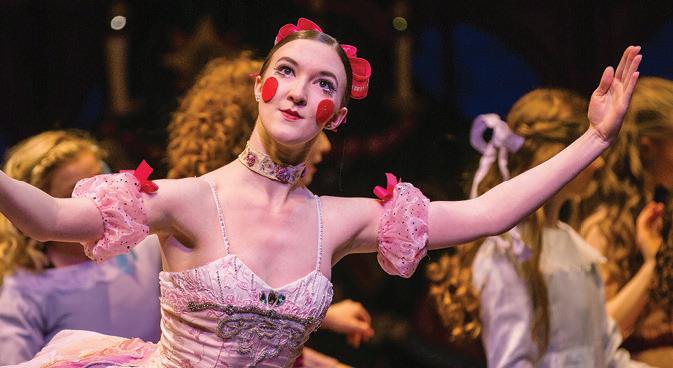

Sociology graduate and UAA Track and Field standout Tylantiss Atlas is this fall’s commencement speaker. In addition to her schoolwork and track, Tylantiss worked for the University Police Department during her time at UAA. On the track, she earned numerous All-Conference, All-Region and All-America honors. She wants to use the opportunity presented by her selection as commencement speaker to tell a story of resilience and perseverance through poetry.
Congratulations, Tylantiss!
the principal dancers, and that dancers train for years to be able to perform at the required level.
When it came to rehearsing for this year’s performance, Eugene Ballet spent two and a half weeks on rehearsal. Four weeks of practice is the amount of time for a production.
“In some ways it’s like riding a bike,” said Tolmie, “because you did it last year and your body remembers the choreography fairly well.”
Tolmie says it feels amazing to be bringing The Nutcracker back after so long. “I think part of it is that everyone is hungry for the live performances that they missed out on for so many years, and so we’re really excited to see them and feel their energy. Anchorage always has a really energized audience.”
Dancers often alternated roles between performances, allowing everyone to play a wide variety of parts. This year Tucker played Herr Drosselmeyer while Tolmie played the mechanical doll during the Christmas party. Both Tucker and Tolmie played the Snow King and Queen, the Sugar Plum Fairy and her Cavalier, and Coffee.
In addition to Eugene Ballet, The Nutcracker was put on in collaboration with Alaska Dance Theatre. Eighty two dancers ages 6 to 18 performed on stage alongside Eugene Ballet performers.
Zoe Zawodny, 13, has done five performances in The Nutcracker; her first at only 7-yearsold. This year she played a party boy during the Christmas party

Ryan Rivers will serve as this fall’s graduate student speaker. After finishing an undergraduate degree in criminal justice and working in the Alaska Court System, Ryan came to UAA to pursue an M.P.A focused on a dual emphasis in public management and public policy. He hopes to use his knowledge and education to solve complex societal issues.
in Act I, and enjoyed being onstage and performing. “It was so big, and there were so many people onstage, it was like, really cool.”
During the party scene, each child had assigned “party parents” from Eugene Ballet who helped when performers didn’t know where to go. “They were all really nice, and none of them really treated us like kids. They treated us more as like, profes-
sional coworkers,” Zoe said. In addition to local dancers, the Anchorage Symphony Orchestra provided 70 Alaskan musicians to perform the music of The Nutcracker live for the dancers on stage.
According to a press release by the Anchorage Concert Association, it is anticipated that over 10,000 attendees made it to the three days of performances.
Different parts were taken from different recipes to make these cinnamon rolls. Note: the recipe is gluten-free but can be altered.
By Carlee Christensen arts1@thenorthernlight.org
The Christmas season is nearly upon us and something my family does around this time is baking one of my personal favorites: cinnamon rolls. However, I haven’t been able to have the ones that my family usually makes because I’m gluten free, so it was time to try ones that I could have.
This recipe takes less time because there’s no yeast involved. The total time should only be about 55 minutes. Within an hour, you should have 12 mini cinnamon rolls. Let’s get started!

Congratulations, Ryan!

Preheat the oven to 350 degrees and grease a muffin tin. Set aside.
Basic cinnamon roll dough
2 ½ cups gluten free flour blend
¼ cup granulated sugar
2 teaspoons baking powder
¼ teaspoon salt ½ cup unsalted butter room temperature, cubed
¾ cup room temperature milk
In a medium bowl, whisk your flour, sugar, baking powder, and salt together. Add your softened butter and stir to combine. Stir in the milk. It should become a basic cinnamon roll dough. The recipe calls for a stand mixer, but I don’t have one so I just did the next part by hand. Transfer the dough onto a lightly floured surface and knead with your hands. Roll the dough out with a rolling pin. I usually cut off the extra pieces to make it a perfect rectangle, but
that’s optional. You can use the extra pieces of dough to make more cinnamon rolls.
Filling
Melted butter
Brown sugar
Cinnamon
Pour the melted butter on to the dough and spread it out in an even layer. Sprinkle brown sugar and cinnamon, and add however much you want.
Start to roll your dough tightly. If your dough is sticky, sprinkle a little flour on your hands to make it easier. Use a knife to cut 12 even pieces, and place each piece in its own muffin tin spot.
Now they are ready to go into the oven. Set your timer for 25 minutes.
Cream cheese
Powdered sugar
Milk
While the cinnamon rolls are baking, it is time to make your cream cheese frosting. Notice that I didn’t add measurements for this section. Depending on how thick you want your icing, you will add more or less of these ingredients. Generally speaking, you should add more cream cheese than anything. You can start with three equal parts and adjust it as needed. Start mixing these three ingredients together until you get the desired consistency.
After taking the mini cinnamon rolls out of the oven, wait for them to cool before topping them with the cream cheese frosting.
Bon appétit!

By Alex Lim KRUA Music Coordinator
After their recent song successes, including “Pretty,” “Pop Star,” and “Crushcrushcrush,” Coco & ClairClair have come out with their newest album, “Sexy.” With more addicting electronic beats and outrageous lines, Coco & Clairclair have leaned into the pretty-bedroomelectronica genre they have found themselves in, and they honestly bring this new fusion genre justice.
There’s a mix of breathy talk-
ing, quick rap and airy singing in all their songs, which keeps each song different from the last, but not straying too far from the overall vibe of the album. For example, “Lamb, feat. Porches,” has a softer beat that would fit more into bedroom pop, while “Be With U (feat. DETO Black)” has a lot more characteristics that make it sound like hyper pop. The experimentalism in “Sexy” makes the confidently playful and sassy energy in this album almost infectious.

By Carlee Christensen arts1@thenorthernlight.org
Anchorage International Film Festival
Location: Various
Date/Time: Dec. 2 - Dec. 11
This annual film festival will take place at various venues around Anchorage including the Anchorage Museum Auditorium, Bear Tooth Theatrepub, and E Street Theater. You can purchase tickets to various film selections on the Anchorage International Film Festival website. The winners will be announced at the Awards Ceremony in Anchorage on Dec. 10.
Little Women Location: UAA Fine Arts
Stage
Date/Time: Dec. 2 - Dec. 18
UAA Department of Theatre and Dance and Perseverance Theatre are partnering to present a production of Little Women. Experience the story based on the novel by Louisa May Alcott come alive by the direction of Cara Hinh. Discounted tickets for students can be purchased on UAATix.
Blue Man Group
Location: Alaska Center for the Performing Arts
Date/Time: Dec. 6 - Dec. 11
The smash hit phenomenon known as the Blue Man Group is coming to Anchorage. It’s everything you’ve come to know about them — creative drumming and colors — but featuring new experiences. Discounted tickets for students can be purchased on UAATix.
UAA Getaway
Location: Seawolf Sports Complex
Date/Time: Dec. 8, 6 - 8 p.m.
It’s time to celebrate the end of the semester with a UAA Getaway. This is an activity filled event with games, live performance, a pool party, free tacos and so much more! Bring your friends and your favorite tropical outfits.
Bright Winter Nights
Location: Alaska Botanical Gardens
Date/Time: Thursdays through Sundays and the last week of Dec. excluding Christmas, 5 - 8 p.m.
Presented by ConocoPhillips Alaska, Alaska Botanical Gardens are going to be decorated like a winter wonderland. This is the perfect family event. Tickets are $10 for members and $14 for nonmembers. Children six and under are free. Tickets can be purchased on the Alaska Botanical Gardens website.
Location: Alaska Zoo
Date/Time: Nov. 18 - Dec. 17, Dec. 22 - Jan. 8 Fridays through Sundays weekly, 5 - 8 p.m.
Sponsored by GCI and ConocoPhillips Alaska, Alaska Zoo presents Zoo Lights, a dazzling lights display through 20 plus acres of wooded trails. This is another event that would be a great experience for the whole family. Tickets are $17 for nonmembers and $12 for members. Children ages two and under are
free. Make some family memories at this magical event.
Holiday Market Location: 49th Brewing Co — Anchorage
Date/Time: Dec. 10 - Dec. 11, 12 - 5 p.m.
The holidays are here and 49th Brewing Co is hosting a holiday market featuring more than 60 vendors, holiday fare foods, carriage rides, and even an appearance by Santa Claus himself. This event is free and open to the public.
Solstice Tree Tour
Location: 9401 W. Raspberry Road Anchorage, AK 99502
Date/Time: Dec. 18, 4 - 8 p.m.
In celebration of winter solstice, the Nordic Skiing Association of Anchorage hosts a tour showcasing the ski-only 2.5-kilometer Mize Loop. Although skiing is encouraged, you can also walk or snowshoe. The tour features festive holiday trees sponsored and decorated by local businesses. Event entree is free and is welcoming to all ages.
New Year’s Eve Celebration and Fireworks
Location: 498 W 3rd Avenue Anchorage, AK 99501
Date/Time: Dec. 31, 7 - 9 p.m.
Ending the year of 2022 is the New Year’s Eve Celebration and Fireworks in downtown Anchorage. This event will include the annual fireworks display and an outdoor party featuring live music.


LGBTQ+ rights are put on the line every time ignorance makes its way into the political agenda
By Jasmine Grant news@thenorthernlight.org
The Matanuska-Susitna Borough school board approved a policy that would prohibit transgender and gender-nonconforming students in the district the right to use the restroom in alignment with their gender identity. This decision is unlikely to hold up in a court of law or provide any sustainable solution for the transgender community of the school district.
“The studies show that transgender youth are actually at higher risk of being sexually assaulted, being the victims of violence, substance abuse, suicide risk, and other sexual risk behaviors than cisgender youth,” said transgender parent, Vincent Boyer, at the Oct. 19 board meeting.
The board was asked for action by a parent of a cisgender girl who allegedly saw and was made uncomfortable by a transgender girl in a school changing room. Public comments made in support of this policy were similar to others of across the country, citing the fear of assault against cisgender girls. However, research suggests that bathroom bans like Mat-Su may put more students at risk than it protects.
A study published in the Journal Pediatrics found restroom and locker room restrictions put transgender girls and boys at a 2.49 and 1.26 times higher risk of sexual assault, respectively. Rates of sexual assault amongst gender-minoriy individuals is
already higher than those who identify with their given gender.
The Mat-Su policy, referred to on their website as 5134 BP, states that each building in the district “shall provide reasonable accommodation to any individual who does not wish to” use the restroom of their biological sex. Reasonable accommodations are defined as “access to a single-occupancy restroom or changing room (such as a nurse’s office or family restroom).” According to the policy, any violations of these parameters “will result in disciplinary action consistent with Board Policy and Administrative Regulations.”
Testimony from transgender individuals suggests that most students will opt for the singleuse restroom rather than use the restroom matching their biological sex. Still, there are downsides and heavy risks associated with using a private stall in public schools.
A UCLA study published in Journal of Public Management & Social Policy in 2013 quantified survey responses from 93 transgender and gender-noncomforing residents in the DC area. About half of the respondents reported physical-related health issues of dehydration, UTIS and kidney-related problems due to holding their bladder to avoid risk of assault in public restrooms.
Besides the ramifications facility-restricitions force transgender individuals to face, they have also been declared unlawful by a United States circuit court.
In 2020, the U.S. Court of Appeals ruled in favor of a transgender student from Virginia who wanted to use the restroom of his gender identity. Gavin Grimm vs. Gloucester County School Board was first filed by the ACLU as a complaint to the U.S. Department of Justice in 2015.
Before an injunction allowing Gavin to use the correct bathrooms during the court battle, he was forced to use the bathroom in his school’s nurses office for the first part of his school year. In a school board meeting Gavin said, “This was alienating, it was humiliating.” He also said travel time to this separate bathroom took time away from his education.
The Mat-Su district policy defines facilities as only available for “a. For the exclusive use of the male sex; or b. For the exclusive use of the female sex” in which “‘Sex’ means the physical condition of being male or female based on genetics and physiology, as designated at the individual’s birth.”
However, the Fourth Circuit had ruled in Grimm’s case that in application of bathroom policies to students the school board could not “rely on its own discriminatory notions of what ‘sex’ means” in reference to clause 106.33 of Title IX, according to a 2022 report by the Congressional Research Service.
The courts clarification of this clause would mean there is no legal justification for MatSu’s new policy. All school board members except Dwight Probasco voted in favor of the
By Tim Willis Contributing Writer
As I watched an episode of Molly of Denali on the history of Elizabeth Peratrovich, I was moved by how the main character handled two tourists that told her she did not look native to them. In her youthful wisdom, she did not become enraged by their comments but understood that they were still hurtful. She
did not seek to attack or hate them; she understood that her strength was in educating them and freeing them from their ignorance. Molly was able to articulate who she is, who her indigenous people are, and their history.
I’ve had to learn the hard way that Molly’s approach tends to be the more successful one. Often, I hear people speak of fighting for their rights, and


policy in the Oct. 19 meeting
wherein Probasco said he believes “this policy is built on sand.”
Parents accused the school board of perpetrating harmful stereotypes about transgender individuals, such as predatory behavior. Laurel Carlson, mother of two in the Mat-Su district, said these bans “exploit the natural desires of parents to keep their kids safe.”
“You claim this ban was an emergency response to a transgender girl using the girls locker room but you also report drawing inspiration from a lawsuit from twenty other states, including Alaska, to block the Biden administrations interpretation of Title IX,” she said.
In the Sep. 21 meeting, Jessica Young said she would appeal to the board’s economic
way justified my aggression.
my heart aches, for I know better than most that no one wins in a fight. As a collegiate wrestler I was trained to fight. And I spent a great deal of my adult life righting wrongs, sticking it to the man, and standing my ground in battle against what I saw as a problem. What I found in this approach was that I became the very monster that I was fighting, and that no matter how wrong their actions were, it in no
One day as I stood over a 280-pound steel worker – who I had dropped on his head after threatening my life – I did not feel victorious, I felt deep pain and remorse for what I had done. I had crushed a man who had only desired respect. But he had been taught that respect was something to be taken and not earned, and instead of educating him, I only made things worse. As time went on, I began to learn new ways to teach – finding myself teachable as well – and the
sense rather than emotional. “Kids will go to college and will never come back to the Mat-Su because they will understand that they are accepted in other places,” she said.
Gender-minority college students are at a 4.3 times higher risk of experiencing a mental health issue according to a study published in the American Journal of Preventive Medicine. The Trevor Project found transgender non-binary youth who felt accepted by school faculty to be at 33% lower odds of attemping suicide.
The rate of suicide in Alaska is one of the highest in the U.S. where suicide is one of the leading causes of death amongst adolescents. Mat-Sus extension of the discrimination faced by queer youth in Alaska could put them at higher risk for suicide.
day I ceased fighting everyone and everything was the first day I truly became victorious.
Today I know more than ever that we must empower our youth; that they may educate the ignorant. We must do as Martin Luther King and Elizabeth Peratrovich did and use knowledge as our sword and speech as our armor, so that there is no more bloodshed, only minds educated, and people brought to a path of empathy through understanding.
The Northern Light encourages readers to express their views in the newspaper. The Northern Light reserves the right to reject or publish any submission, online or in print.
Letters to the editor can be submitted to editor@thenorthernlight.org. The maximum length for a letter to the editor is 250 words, and 150 words for letters specifically endorsing candidates for federal, local, or university office. A letter to the editor is written by someone who does not have authoritative knowledge on the subject they are discussing. Contributors are restricted to one published letter to the editor per month.
Opinion pieces can be submitted to editor@thenorthernlight.org. The maximum length for a contributor’s opinion piece is 450 words. Contributors are restricted to one published opinion piece per month. Opinion pieces written by staff of The Northern Light are limited to 800 words. An opinion piece that is published in The Northern Light should be written by someone who has authoritative knowledge on the subject they are discussing.
Letters and opinion pieces are subject to editing for grammar, accuracy, length and clarity. All letters and opinion pieces must include names, major and/or group affiliation and contact information for verification purposes. The Northern Light will not publish anonymous letters or pseudonyms. Requests for corrections can be sent to editor@thenorthernlight.org. Print publication is subject to accuracy and available space. All corrections are posted online with the original story at www. thenorthernlight.org. The deadline for submissions is the Friday before publication at noon, no exceptions.
The Northern Light newsroom is located on the first floor of the Student Union Room 118.
By Carlee Christensen arts1@thenorthernlight.org
Our very own Cole Nash earned All-American honors after finishing sixth at the NCAA Division II Cross Country National Championships on Friday in University Place, Washington. He finished the 10-kilometer course in 29:57.
Dillon Powell from Colorado School of Mines won the race, clocking in at 29:28.
This is the second year in a row that Nash has earned this honor, finishing 27th as a freshman at the 2021 National Championships.
“It went exactly as planned, started out really fast and thought at 1k that this is way too fast and I’m going to die and it turns out I did die, I just died less than everybody else did… It was as close to perfect as it could’ve been without quite getting in that top 5,” Nash said.
UAA junior Michael Zapherson finished 55th with a time of 30:47.
Zapherson said, “I was trying to shoot for an All-American spot, which is top 40. I went out and I put myself in a position where I could hopefully move up to that top 40. I was roughly at 50th or 60th place and then —
it was just a tough day. I couldn’t quite get to the top 40 … but I’m not too upset about it.”
Zapherson said he was shocked when he got his spot to go to nationals. In the regional race he got 7th, which put him in the position to potentially go to nationals. However, he said he was in the mindset after their conference meet that he wouldn’t make it.
UAA Cross Country coach Chas Davis said how proud he was of his athletes. He said that Nash is a huge talent; he’s not surprising anyone. He has this target on his back to execute un-
By Avery Williamson sports@thenorthernlight.org
The Seawolves dominated while on the road, defeating the University of Nevada, Las Vegas 3-1 and Liberty University 9-1 on Nov. 16 and 17, respectively, in Las Vegas.
Having previously blown out UNLV 8-0 on Oct. 14, UAA returned to the ice with confidence. The team wasted no time getting on the scoreboard as Max Helgeson scored on the first shot, 19 seconds into the game.
UAA remained in the lead until UNLV tied it 1-1 with a
long shot 15 minutes into the final period. UAA’s Carter Belitski scored three minutes later to help the Seawolves regain the lead.
Desperate for another goal, UNLV pulled their goalie from the game to put another offensive player on the ice. This strategy backfired, though, as the Seawolves skated past their defense in the final minute of the game and Matt Allen scored an easy empty-net goal to win the game 3-1.
UAA out-shot UNLV 3315 and seawolf goalie Joey Lamoueaux finished with 14 saves. The Seawolves laced up

By Avery Williamson sports@thenorthernlight.org
The Seawolves alpine ski teams swept the men’s and women’s podiums in the giant slalom at the Yukon Federation of International Skiing races on Nov. 18 in Whitehorse, Canada. Their sweep signified the beginning of a hopeful season.
Jan Ronner took the top spot on the men’s podium, finishing with the fastest first run. Ronner’s two-run time run was 1:57.85.
Caeden Carruthers finished second with a time of 1:58.09. He finished second in both his first and second runs. Hunter Eid finished third with a time of 1:58.16, and Moro Bamber finished fourth with a time of 2:00.43.
The UAA women were
equally impressive, taking the top six spots. Ashleigh Alexander took the top podium with a two-run time of 2:04.79. Ainsley Proffit finished second with a time of 2:05.11 and Ella Bromee was third with a time of 2:05.33. Alyssa Hill
and hit the ice again the next day to take on the Liberty Eagles. From earlier on the game turned out to be another blowout. Caleb Hite, Conor Cole, Matt Johnson and Jarred White each scored in the opening period to give the Seawolves an early 4-0 lead.
UAA maintained their momentum in the second period as Matt Kinash, Cole and Helgeson scored three more goals to extend their team’s lead to 7-0.
Liberty was able to connect with the net once, but the Seawolves shut them out of the rest of the game as Ben Almquist scored two goals in the third period to complete the scoring for UAA and secure a 9-1 victory for the Seawolves.
UAA returns to the Seawolf Sports Complex on Dec. 2 and 3 to take on Simon Fraser for the second time this season. The Seawolves faced a devastating 1-0 loss against SFU on Sep. 23. in their first game after a nearly 900 day hiatus.
Head to the rink on Dec. 2 at 7 p.m. and 6 p.m. the following day to cheer on the Seawolves and help them get redemption over the Red Leafs.
finished fourth, Carmen Nielssen was fifth and Olivia Carrier finished in sixth.
“Great day for Ash and Jan,” said UAA coach Sparky Anderson. “Can’t ask for a better start to the season. Training has been productive and we still have a lot of work in front of us.”
The ski team plans to have a home competition at Kincaid Park on Jan. 3. Head out there to support our Ski-wolves.
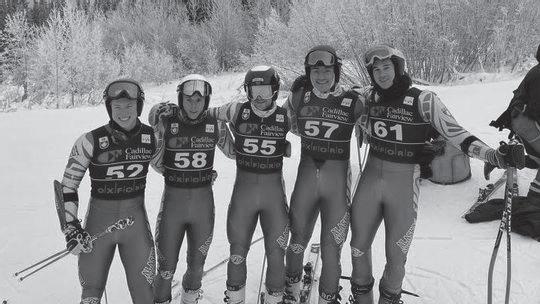
der the pressure, said Davis. Davis said he was impressed with Zapherson’s ability to stick with the plan. Davis advised him to work his way up from being near 75th, in the middle of the race, and finish near the top 40. It didn’t go quite according to plan, yet there’s no shame in finishing 55th in the national race, said Davis.
In races with this much pressure, runners have to put themselves out there with a more aggressive style of racing that they may not be used to, Davis said. It takes mental strength along with all the physical elements to run in a race like this. Davis said
he is proud of how his athletes handled this race.
Colorado School of Mines took first place as a team with a score of 43, ahead of Wingate who placed second with a score of 177. All Colorado School of Mines’ runners earned AllAmerican honors placing in the top 30.
The top results for the individual men 10k race are as follows; Dillon Powell of Colorado School of Mines with a time of 29:28, Tanner Chada of Grand Valley State with a time of 29:47, Duncan Fuehne of Colorado School of Mines with a time of 29:48, Zach Kreft of Walsh with a time of 29:53, Afewerki Zeru of Colorado Springs with a time of 29:54, and Cole Nash of Alaska Anchorage with a time of 29:57.
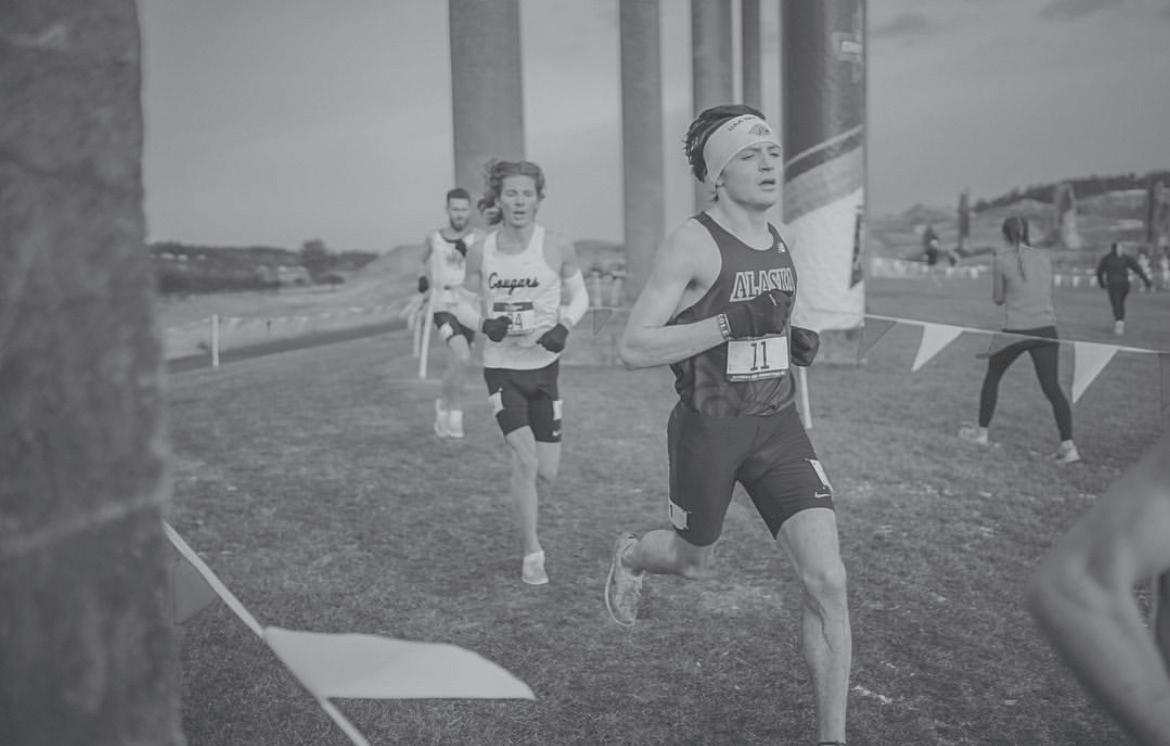
Graduated but still have athletic eligibility? What you can do
you’re interested in.
By Avery Williamson sports@thenorthernlight.org
According to NCAA eligibility rules, student-athletes are allowed five years to compete athletically in four seasons. Because the COVID-19 pandemic disrupted nearly all sporting activities, the NCAA granted an extra year of athletic eligibility to collegiate athletes whose sporting seasons were affected by the pandemic.
The NCAA gives every athlete the option to “redshirt” for one season during their career, meaning the athlete can sit out one season and still maintain four years of eligibility. A redshirt season may be used if the athlete isn’t ready to compete competitively, whether due to an injury or needing further development. These rules make it possible for an undergraduate student – or even a graduate student – to receive their diploma with athletic eligibility still left in their pocket. So what can you do with that eligibility?
Enroll as a graduate student UAA offers many graduate programs, including more than 20 master’s programs and six doctoral programs. This option is best for undergraduates seeking higher education. Visit uaa.alaska.edu to find a program
Get another bachelor’s degree
If you’re feeling a little uneasy about the degree you just received, there’s nothing wrong with picking a new major and pursuing another bachelor’s degree. This option is best for undergraduates that are interested in making a career change.
Take whatever classes you want
You don’t have to be actively pursuing a degree in order to be enrolled at UAA. If you’re not interested in receiving another degree, you can take random classes. This option is best for undergraduates or graduates that want to keep competing in sports but don’t want another degree.
Leave it be
You won’t be penalized for graduating with athletic eligibility leftover, so don’t feel like you have to do something with it. This option is best for undergraduates that are ready to be done with school.
Remember, your eligibility clock starts the first time you enroll as a full-time student. Your clock does not stop if you decide to redshirt, if you do not attend college, or if you go part-time. If you still have eligibility left and you want to use it, now’s your chance.
Format: First name, Middle initial, Last name with * at end of name for Cum Laude, ** for Magna Cum Laude, *** for Summa Cum Laude.
COLLEGE OF ARTS AND SCIENCES
Dr. Jenny McNulty, Dean
DOCTORATE DEGREES
DOCTOR OF PHILOSOPHY
Clinical-Community Psychology
Michael R. Covone
Kevin Halvorsen
Jacy R. Hutchinson
Ziyang Jin
Tracy J. Stewart
MASTER’S DEGREES
MASTER OF ARTS
Anthropology
Jay P. Rapoza
Oliver G. Smith
Randolph M. Tedor
MASTER OF FINE ARTS
Creative Writing and Literary Arts
Rachael I. Ball
Sara Dennison
Sarah H. Mickey
Karen R. Nelson
Mary F. Samson
Monica Stein-Olson
MASTER OF SCIENCE
Applied Geological Sciences
Austin M. Cunningham
Biological Sciences
Alexzandrea DePue
Brittney DePue
Rachel M. Gingras
Caitlin A. Kollander
Vanessa L. Muhlenbruch
Amanda M. Mumford
Davis J. Stewart
Levi J. Wegner
Lindsay B. Wienkers
Clinical Psychology
Jasmine J. Burton
Zoe S. Dietz
Kayla L. Nowak
Maredyth B. R. C. Salazar
Tiera M. M. Schroeder
Jade K. Stovall
Interdisciplinary Studies
Rachel M. Richardson
GRADUATE CERTIFICATES
Children’s Mental Health
Tracey P. Eason
Jessicaanne S. Fernandez
Caitlin M. Fitzpatrick
Breanna H. Foster
Cassidy M. Hobbs
Kari L. Michael
Maredyth B. R. C. Salazar
MariaJose St John
Jade K. Stovall
Lindsay M. Williams
BACCALAUREATE DEGREES
BACHELOR OF ARTS
Anthropology
Jacob K. Ballard**
Nelson A. Kempf**
Alexandra L. Lacy
Disclaimer:
Kevin Oktavianes
Adrianne J. Takak
Art
Sara E. Brenner**
Grace L. G. Britton*
Christina R. Cramer
Sharon F. Hunter
Amy O. Jettenberg
Talia N. Leauanae
Molly S. Mayer**
Lillian A. Mitchell
Kathryn Verbarendse
Biological Sciences
Tisha O. Valentine
English
Collin M. Becker*
Emma R. Bott-Murphy
Phillip D. Granath
Chelsea A. Kueser**
Amani J. McCummings
Liza R. Singleton-Havner
Elsa M. Snodderly**
Sophie M. Wright
Yumeko M. Ziegler*
History
Jeremy Agee
Denile R. Ault
Jacob E. Dargis*
Christian S. Howlett
Sharon F. Hunter
Michael W. Johnson*
Kassidy N. Kaiser***
Molly S. Mayer**
Tirzah M. Young**
International Studies
Mayuka Kobayashi
Baihong Ye
Journalism and Public
Communications
James Boatman
Corey Coolidge
Suzanne P. Fonova
Benjamin R. Hagensieker
Teresa A. Hagensieker*
Gloria L. Lord*
Callum Toohey
Lucas E. Wright*
Languages
Veronica Avila
Jacob K. Ballard**
Alexandrea D. Guild*
Cheyenne M. James*
Kassidy N. Kaiser***
Tia M. Kelliher
Eliza B. Lawler
Ryo Sugai
Philosophy
Collin M. Becker*
Kathleen A. Dalton*
Micah O. Foreman
Political Science
Angelo K. Amorin
Joseph M. Donald Jr.
Psychology
Harvey J. J. Ancheta
LaWanda D. Blakely
Corey M. Boiko*
Irene S. Boll*
Tamia Y. Bunton
Taylor A. Carlson
Jeffry L. Crews
Mallory C. DenBoer
Shannon R. Fries*
Taylor V. A. Graham
Stacey M. Ham
Sierra M. Hernandez
Jennifer A. Hise
Shafia L. Hleihil
Sara M. Hogan
Hailey A. Holland**
Elizabeth A. Jamison
Collin D. Lane
Anyi X. Patton
Allison Rath*
Fernanda Ruiz*
Andria D. Semmler
Sociology
Tylantiss L. Atlas
Anna Maria Smith
Janelle A. Tingook
Theatre
Galina E. Deitz
Lydia D. Smith*
BACHELOR OF FINE ARTS
Art
Austin R. Pyle
BACHELOR OF MUSIC
Music
Lara R. Millette*
Zeke K. Thompson*
BACHELOR OF SCIENCE
Anthropology
Justin S. Jette
Benjamin M. Miller
Biological Sciences
Gerald M. Aradanas
Christian S. Balmes*
Samantha C. Blann
Feona D. Carney**
Corbin R. Flaming*
Rees D. Howell
Davin Louangaphay
Victoria M. Oberts*
Shannon T. Powers**
Jeorge D. Sawyer*
Kevin S. Shedlock
Sheridan J. Sherlock
Sayeed A. Talha Bin Zubaeir
Ashlee N. Voorhis
Keeley A. Wall
Christopher S. Xiong
Chemistry
Luke M. Jones
Michael A. Martinez
Bre’ Anna H. L. Sherman**
Juliana M. Smit
Environment and Society
Lavinia M. S. Harris
Ashlyn M. Johnson*
Jered E. Kemp
Raphael A. Turner
Geological Sciences
Alyssa H. Albright
Autumn V. Fox
Ambrosia L. Rhoads
Andriana Strezoski*
Mathematics
Edward S. Hazelton*
Daniel Sgambati
Natural Sciences
Cooper G. Arend
Jamie R. Bagley
Teresa M. Becher
Ekaterina A. Cook**
Tyler J. Fenton
Peter A. Giannulis*
Ashley R. Gibson
Amanda Ludwig
Haley L. Lugers
Andrew W. Lutz
Alyssa N. Mandich**
Melissa A. Miller*
Sophia C. Myrick
Nicole J. Patkotak*
Benjamin J. Peck
Meagan J. Price
Ericka F. Reynolds*
Sendy L. Snickers
Logan C. Suiter
Joshua K. Taylor*
Mary K. Thorman
Keeley A. Wall
Kipp H. Wilkinson
Psychology
Isis I. Allen
Aakash R. Bathija
Halle L. Beaver*
Halley R. Evans
Garett D. Granado
Ashlan M. Hooton
Jonathan T. Le
Ashton A. LeKites**
Bristol I. Lerner
Jessica N. Weier**
ASSOCIATE DEGREES
ASSOCIATE OF ARTS
Alaska Native Studies
Dawn A. Randazzo
General Program
Zachary C. Abdallah
Alison A. Achee
Sasha N. Addison***
Corbin C. Allen
Miles A. Apatiki
Keila J. Aurelio
Kylie N. Baker
Hailey E. Barnes
Malia L. Batchelder
Heather L. Bear
Hunter J. Beck**
Amy M. Berlin
Sean F. Bever
Aaron B. Bravo
Elizabeth R. Breneman
Harry P. Bryan
Tamia Y. Bunton
Aleksei G. Burton**
Aileia K. Caldwell*
Damaris Chacon
Hannah Cionie D. Cinco*
Hunter C. Dely
Madison P. Dittmeier
Blair O. Dunlevy
Kylie R. Evans*
Alyssa J. M. FarnsworthBankston
Tyler G. Fevurly
Lindsey J. Foshee*
Sean W. Fultz*
Cariane Gonzalez**
Rex B. Gonzalez
Madison R. Head
Madison E. Horton
Kaitlyn M. B. Johnston
Hannah L. Kilbourne**
Ronan M. Klancher
James M. Lanier
Bryce M. Leighton
Roselyn A. Lowe
Haley N. Lundak
Ethan O. Mack
Tabitha J. Marley
Sydney M. McQuaide
Hanna Merrington
Laiken A. Monahan
Emily A. Moody***
Hee Namgung
Victoria M. Oberts*
Errol J. Otto
Lisa Pehrson*
Trisha L. Pevan
Amy D. Phillips
Charity M. Price
Meiglan V. Ray
Nicole M. Regan
Anna E. Richardson***
Petula J. Sagan*
Charlize H. Sidro**
Riley A. Simes
Kylee R. Smith
Corey E. Stafford
Heather M. Stefanec*
Angel Stewart
Morgan E. Swan
Cindy Tabares
Tatum C. Taylor
Anthony F. Vigil*
Wanda E. Waldon
Ava White*
Chelsea M. Williams
Jaydin A. Winzenburg
Stephanie J. Wuthrich
SCHOOL OF EDUCATION
Dr. Tonia Dousay, Director
MASTER’S DEGREES
MASTER OF EDUCATION
Teaching and Learning
Heather M. Davis
Jenell J. Hartman
Kyle G. Holloway
GRADUATE CERTIFICATES
Language Education
Sarah E. Dimmick
Svetlana Filkova
Ivory R. Hudon
Brooke Reddick
Principal Constance R. Villalobos
POST-BACCALAUREATE CERTIFICATES
Speech Language Pathology Aiden Keller
ASSOCIATE DEGREES
ASSOCIATE OF APPLIED SCIENCE
Early Childhood Development
Morgan E. Swan
OCCUPATIONAL ENDORSEMENT CERTIFICATE
Infant and Toddler Development
Mary E. Anger
Jillian K. Stettenbenz
Devyn R. Wells
COLLEGE OF BUSINESS AND PUBLIC POLICY
Dr. John Nofsinger, Dean
MASTER’S DEGREES
MASTER OF BUSINESS ADMINISTRATION
General Management
Doreen R. Andersen
Rinnah S. Andrew
Claire E. Cascio
Andrea L. Miller
Ryan Navrot
Caden D. Price
Kelsie A. L. Sullivan
LeAnn M. Tiffany
MASTER OF PUBLIC ADMINISTRATION
Sandra M. Blum
Susan M. Fallon
Olivia M. Pfeifer
Ryan A. Rivers
MASTER OF PUBLIC POLICY
Emma M. Kimball
MASTER OF SCIENCE
Global Supply Chain Management
Gunnar Nagel
Pierre D. Thompson
MASTER OF SCIENCE
Nursing Science
Janelle M. Brandon
Eric C. Rice
Ashley Rucker
Morgan J. Warren
GRADUATE CERTIFICATES
Family Nurse Practitioner
Jennifer A. Gehrke
Nursing Education
Marguerite N. Leeds
BACCALAUREATE DEGREES
BACHELOR OF SCIENCE
Nursing
Ashley N. Abena
Isabella D. Banegas
Emma G. Berry*
Rebecca R. Bond
Thomas E. Buckley
Annette R. Burlison*
Robyn N. Burton
Elizabeth L. Condio
Kevin P. Fast
Grace L. Fritzel**
Esther C. Frykman-Brinkman
Alec J. Goulet
Alexis C. Greszczuk
Ashley N. Grill
Michelle K. Halbert
Gabrielle Hoessle
Jenna K. Humphrys*
Amber L. Hurst*
Christine A. Jarupakorn
Travis C. Johnson
Alexandra G. Johnstone
Julia N. R. R. Kahumoku
Felix Kemboi
Haylee Longsine*
Rebecca M. Luciani
Iris O. Neary*
Sharadon J. OConnor*
Robelyn S. Pounds
Annie M. Quinn
Victoria A. Rahm*
Katelyn Ridlington
Won J. Ro
Holly K. Sacora
Nai H. Saelee
Felipe F. Sendaydiego
Jacqueline M. Simmons
Whitney G. Simpson
Angel Noreen S. Singcay
Stephanie L. Stepp
Mai Y. Thao
Maria Thao
Pajai Thao
Lillian G. Timchak
Rhea Silvie B. Uligan*
Khou Vang
Laura A. Wakefield
Kaitlynd A. Ward-Hamer
Winter L. West
Martina L. Yanish
Executive Editor
Matthew Schmitz (907) 786-1313
editor@thenorthernlight.org
News Editor
Carlee Christensen arts1@thenorthernlight.org
Layout Editor Zach Christensen layout@thenorthernlight.org
News Reporter
Dylan Flos contributor@thenorthernlight.org
News Reporter
Kyle Ivacic news2@thenorthernlight.org
News Reporter
Taylor Heckart
news3@thenorthernlight.org
Marlo C. Yeager
Katie A. Zagar
ASSOCIATE DEGREES
ASSOCIATE OF APPLIED SCIENCE
Nursing
Alice H. M. Amaktoolik
Karen Q. Andrade
Marie K. Balamou
Nicole R. Bon
Karen I. Bottorf
Danielle J. Bradford
Alice M. Breshears**
Amber M. Bukowski
Jaylouis A. Capala
Catherine H. Carpenter
Kimberly L. Churchill
Micheala P. Cole
Billie T. Comley
Daniel A. Corscadden
Georgia F. Cox*
Rhodora P. Ferris
Tracy K. Ford
Dyan Marie d. V. Garcia
Tanya L. Ginter
Joshua C. Hejl
Caitlin K. Hensel
Shyan H. Horner
Kimberly L. Ibay
Modupe O. Idowu
Chloe Frances P. Kies
Tiffany M. Kohn
Megan M. Lango
Kimberly C. Larson
Chelsea M. S. Lee*
Jayne G. Leighton
Christian Ryan B. Lim
Naomi R. Limestoll
Gina M. Lusher
Kathryn L. McClarin**
Danielle L. Owens
Anna I. Perez
Denise P. Reed
Claudia V. Ruiz**
Joseph H. Sadley
Regine C. Saturnino
Channel N. Scherer**
Sophia J. Schultz
Stephanie C. Scott
Stephanie M. Stevens
Cerelia Terrell-Ruiz
Miana S. Thomas
Melanie C. Trost*
Desiray K. Turner
Michael L. Vicente
Jenifer L. Willoughby
Mai Kang Xiong
Ebtehal H. Zeid
SCHOOL OF SOCIAL WORK
MASTER’S DEGREES
MASTER OF SOCIAL WORK
Jordyn E. Block
Amanda S. Hansen
Joseph E. Henry
Bernice T. Hetherington
Features Reporter Kellie Davis features2@thenorthernlight.org
Opinion Writer Jasmine Grant news@thenorthernlight.org
Sports Reporter Avery Williamson sports@thenorthernlight.org
BACCALAUREATE DEGREES
BACHELOR OF SOCIAL WORK
Paulo Martin A. Baylon
Deedee Brady
Tamia Y. Bunton
Ja’leie D. Edwards
Sara O. Langi
Joseph D. Oliver*
Cheyanne D. Palmer
Mandy S. Wilson
COMMUNITY AND TECHNICAL COLLEGE
Dr. Ray Weber, Dean
BACCALAUREATE DEGREES
BACHELOR OF SCIENCE
Applied Technologies Leadership
Annalynn G. Brown**
Nikolaos Giannulis
Cailey R. Hermansen-Jent
Jacob L. Hoover
Anna L. Margeson
Eleanor M. Oydna*
Korbyn E. Powers
Timothy Prielipp
Ricardo A. Reid Jr
Gloria L. Rhodes
Justin R. Sandoval
Wynton M. Sparks
Brett L. Vadla
Aviation Technology
Ransom J. Allison
Kierann B. Bailey
Joshua T. Bryant
Marcus L. Card
Hyeong-Jin Choi
Katria Clark
Shaun Decasas*
Seth D. Franklin
Luke G. Jackson
Quinn T. Johnson
Charles R. LaBarre-Lines*
Hristos G. Maroudas
Jaylon M. Miller
Matthew G. Moore
Jacob W. Moos**
Aaron M. Novak*
Christopher S. Reese
Deven Wesolowski**
Nicole K. Wollgast
Dakota R. Young
Construction Management
Ryan E. Bancroft
Daniel J. Casey*
Mark Knarr**
Occupational Safety and Health
Rodney A. Adams
James L. Decker
Craig S. Donaldson

Lucas T. Dubie
Amanda M. Frenzel
Acery P. Garcia
Michelle D. McCoy
ASSOCIATE DEGREES
ASSOCIATE OF APPLIED
SCIENCE
Air Traffic Control
Rishika R. Kesavaram
Vincent Scalapino
Automotive Technology
Asa E. Boardway
Carson T. Inks
Aviation Administration
Katria Clark
Aviation Maintenance
Technology
Allison Donaghy*
Robert M. Lewis
Lisa M. Milkovich
Computer and Networking
Technology
Elizabeth M. Balan
Steven W. Carraway*
Culinary Arts
Kevin E. Gabbert
Roderick J. Horner
Asmau I. Mcnair
Diesel Power Technology
Nicholes T. Treadway
Occupational Safety and Health
Brandon R. Haworth
Josh A. Koppy
Gary N. Santos
Professional Piloting
Cody R. Davidson**
Nicole K. Wollgast
Technology
Tusipepa L. Savaiinaea
CERTIFICATES
Aviation Maintenance
Technology, Airframe
Logan T. Ball
Anthony Barlow
Curtis A. Evans
Michael P. Kemper
John A. Laurin
River Macasu
Tyler C. Orth
Kyle C. Sandeen
Aviation Maintenance
Technology, Powerplant
Logan T. Ball
Anthony Barlow
Desaun R. Land
John A. Laurin
Tyler C. Orth
Shelby S. Samuel
Diesel Power Technology
Dimitar S. Dragiev
OCCUPATIONAL ENDORSEMENT CERTIFICATE
Advanced
Welding
Andrew J. Cookson
Steven R. Cordes
Edward G. Payne
Automotive Engine Performance
Doc L. Curtis
Baking and Pastry Arts
Amy M. Green
Hospitality
Ian J. Walker
IT Support Desk Technician
Eddie A. Thomas Jr.
Nondestructive Testing
Technology
Tusipepa L. Savaiinaea
Safety Specialist
Shellina L. Irwin
Welding
Alex D. Alvarado
Andrew J. Cookson
Daniel C. Flores
Tusipepa L. Savaiinaea
UNIVERSITY HONORS COLLEGE
Dr. Melanie Hulbert, Dean
University Honors Scholars have completed all of their disciplinary college and University Honors College requirements with a cumulative GPA of 3.50 or higher. University Honors Scholars are wearing a green and gold twisted honor cord along with an additional gold honor cord signifying traditional Latin honors.
*Cum Laude, ** Magna Cum Laude, *** Summa Cum Laude
UNIVERSITY HONORS SCHOLARS
Research & Creative Activity Track
Katya Cook**
COLLEGE OF ARTS AND SCIENCES
English Yumeko Ziegler*
The Northern Light is a proud member of the Associated Collegiate Press. The Northern Light is a monthly UAA publication funded by student fees and advertising sales. The editors and writers of The Northern Light are solely responsible for its contents. Circulation is 2,000. The University of Alaska Anchorage provides equal education and employment opportunities for all, regardless of race, color, religion, national origin, age, sex, Vietnam-era or disabled-veteran status, physical or mental disability, changes in marital status, pregnancy or parenthood. The views expressed in the opinion section do not necessarily reflect the views of UAA or the Northern Light.
The University of Alaska is an affirmative action/equal opportunity employer and educational institution. The University of Alaska does not discriminate on the basis of race, religion, color, national origin, citizenship, age, sex, physical or mental disability, status as a protected veteran, marital status, changes in marital status, pregnancy, childbirth or related medical conditions, parenthood, sexual orientation, gender identity, political affiliation or belief, genetic information, or other legally protected status. The University’s commitment to nondiscrimination, including against sex discrimination, applies to students, employees, and applicants for admission and employment. Contact information, applicable laws, and complaint procedures are included on UA’s statement of nondiscrimination available at www.alaska. edu/nondiscrimination.